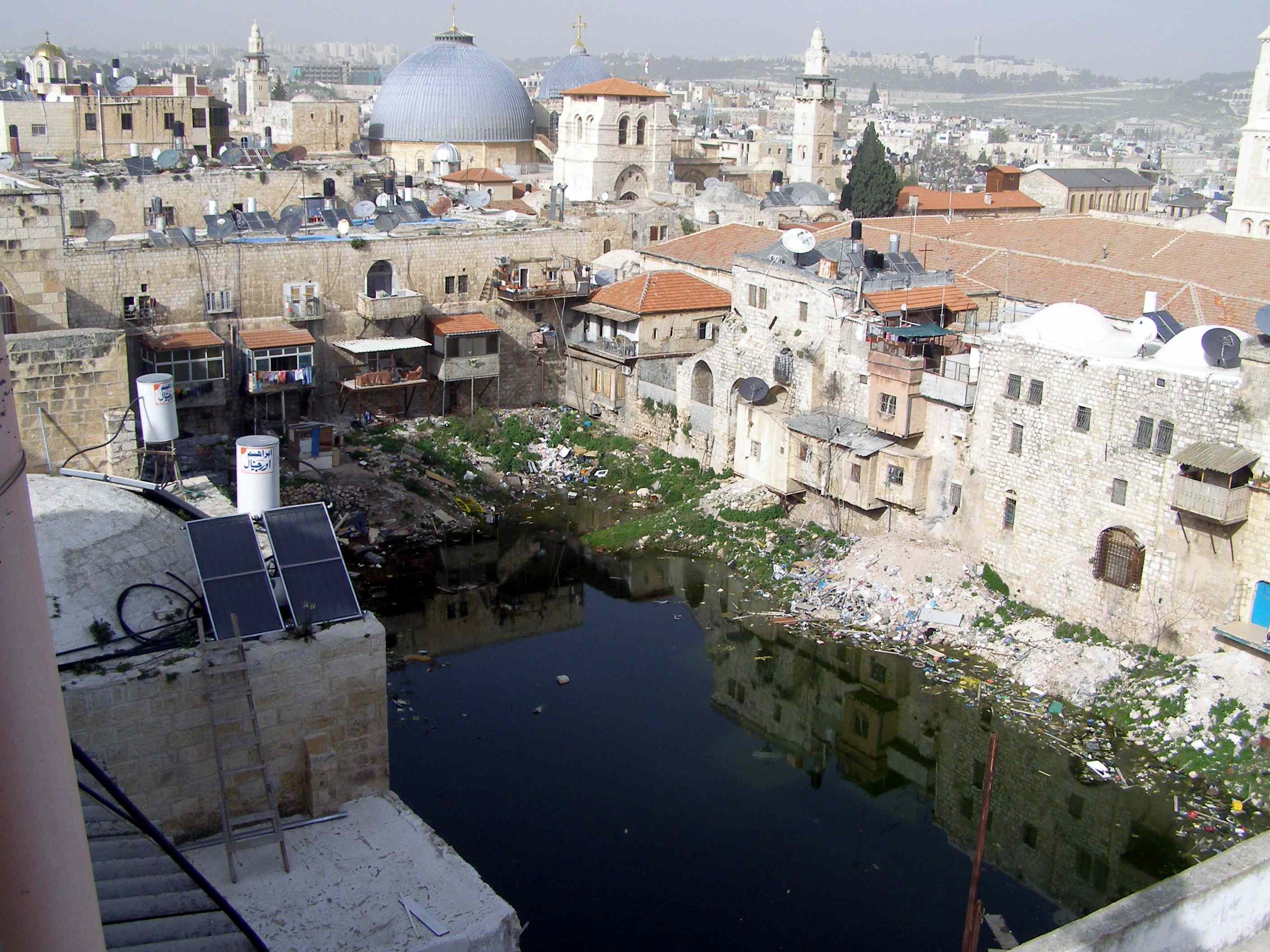Hezekiah's Pool on:
[Wikipedia]
[Google]
[Amazon]
 Hezekiah's Pool ( he, בריכת חזקיהו, ''Brikhat Hizkiyahu''), or the Patriarch's Pool, located in the
Hezekiah's Pool ( he, בריכת חזקיהו, ''Brikhat Hizkiyahu''), or the Patriarch's Pool, located in the

 Hezekiah's Pool ( he, בריכת חזקיהו, ''Brikhat Hizkiyahu''), or the Patriarch's Pool, located in the
Hezekiah's Pool ( he, בריכת חזקיהו, ''Brikhat Hizkiyahu''), or the Patriarch's Pool, located in the Christian Quarter
The Christian Quarter ( ar, حارة النصارى, ''Ḥārat al-Naṣārā''; he, הרובע הנוצרי, ''Ha-Rova ha-Notsri'') is one of the four quarters of the walled Old City of Jerusalem, the other three being the Jewish Quarter, ...
of the Old City of Jerusalem
The Old City of Jerusalem ( he, הָעִיר הָעַתִּיקָה, translit=ha-ir ha-atiqah; ar, البلدة القديمة, translit=al-Balda al-Qadimah; ) is a Walls of Jerusalem, walled area in East Jerusalem.
The Old City is traditio ...
, was once a reservoir
A reservoir (; from French ''réservoir'' ) is an enlarged lake behind a dam. Such a dam may be either artificial, built to store fresh water or it may be a natural formation.
Reservoirs can be created in a number of ways, including control ...
forming part of the city's ancient water system.
History

Flavius Josephus
Flavius Josephus (; grc-gre, Ἰώσηπος, ; 37 – 100) was a first-century Romano-Jewish historian and military leader, best known for ''The Jewish War'', who was born in Jerusalem—then part of Roman Judea—to a father of priestly des ...
referred to the pool as Amygdalon, meaning 'almond tree' in Greek
Greek may refer to:
Greece
Anything of, from, or related to Greece, a country in Southern Europe:
*Greeks, an ethnic group.
*Greek language, a branch of the Indo-European language family.
**Proto-Greek language, the assumed last common ancestor ...
, but it is very likely that he derived the name phonetically from the Hebrew
Hebrew (; ; ) is a Northwest Semitic language of the Afroasiatic language family. Historically, it is one of the spoken languages of the Israelites and their longest-surviving descendants, the Jews and Samaritans. It was largely preserved ...
word ''migdal'', meaning 'tower', thus it is believed that the original name was Pool of the Tower or Towers. The pool is also known as the ''Pool of Pillars'', or the ''Pool of the Patriarch's Bath'' (Arabic: ''Birkat Hammam el-Batrak'').
The pool is believed to be the upper pool referred to in the Books of Kings (), built by King Hezekiah , who met messengers from the king of Assyria
Assyria (Neo-Assyrian cuneiform: , romanized: ''māt Aššur''; syc, ܐܬܘܪ, ʾāthor) was a major ancient Mesopotamian civilization which existed as a city-state at times controlling regional territories in the indigenous lands of the As ...
there. At a later time it was fed from the Mamilla Pool
Mamilla Pool (also known as ''Birket Mamilla'') is one of several ancient reservoirs that supplied water to the inhabitants of the Jerusalem. It is located outside the walls of the Old City about northwest of Jaffa Gate in the centre of the M ...
, one of the three reservoir
A reservoir (; from French ''réservoir'' ) is an enlarged lake behind a dam. Such a dam may be either artificial, built to store fresh water or it may be a natural formation.
Reservoirs can be created in a number of ways, including control ...
s constructed by Herod the Great
Herod I (; ; grc-gre, ; c. 72 – 4 or 1 BCE), also known as Herod the Great, was a History of the Jews in the Roman Empire, Roman Jewish client state, client king of Judea, referred to as the Herodian Kingdom of Judea, Herodian kingdom. He ...
during the first century BCE by an underground conduit which still partially exists.
The pool is by in size, with an estimated capacity of nearly . The bottom of the pool is cemented and leveled natural rock.The Land of Israel; A Text-Book on the Physical and Historical Geography of the Holy Land Embodying the Results of Recent Research, Robert Laird Stewart, 2008. Page 178 the pool is dry and surrounded by buildings on all sides.
References
External links
* * {{Authority control Buildings and structures completed in the 8th century BC Buildings and structures completed in the 7th century BC Reservoirs in Jerusalem Herod the Great Classical sites in Jerusalem Establishments in the Kingdom of Judah Hezekiah Books of Kings Christian Quarter